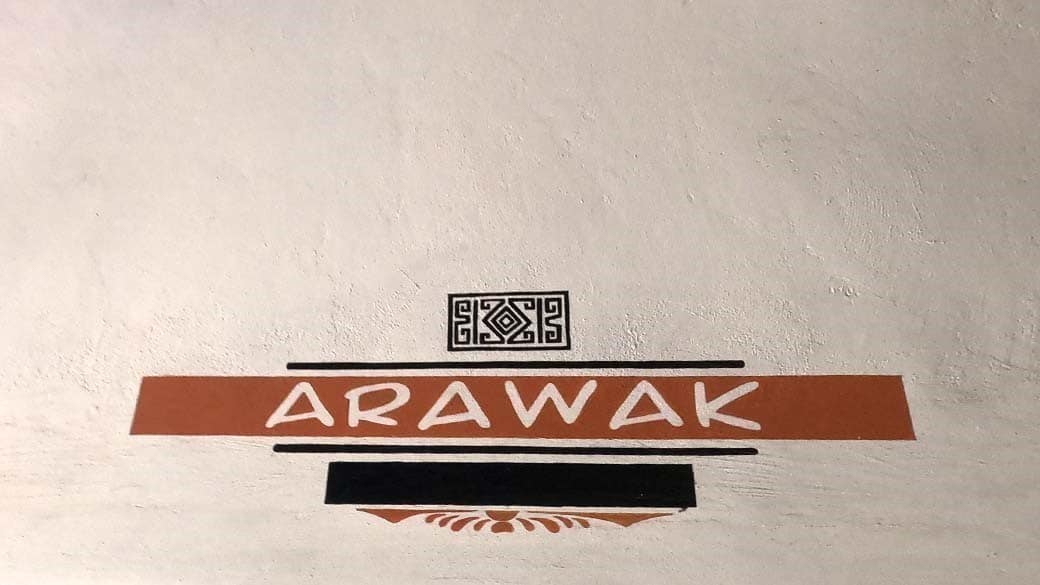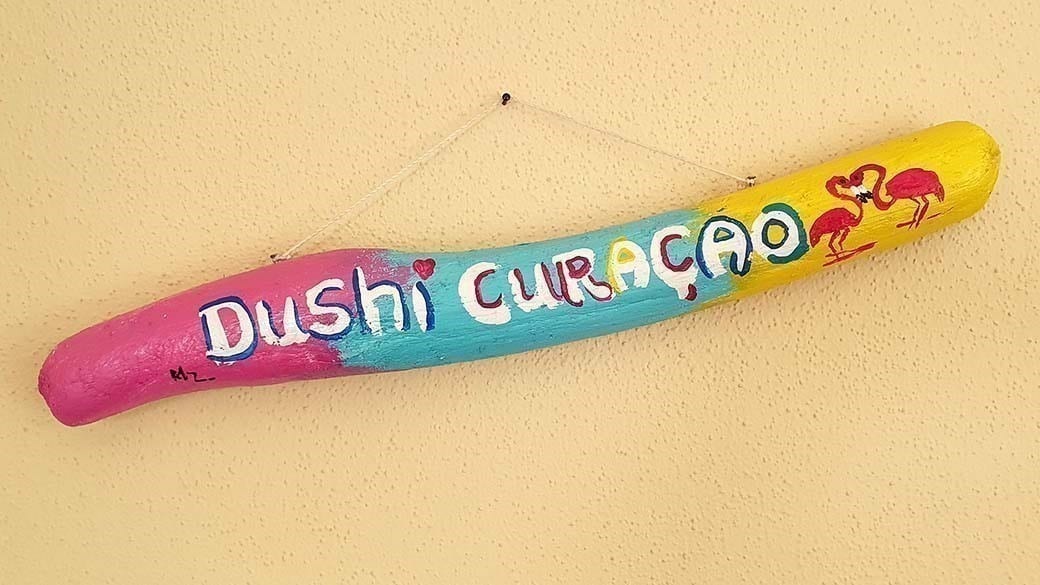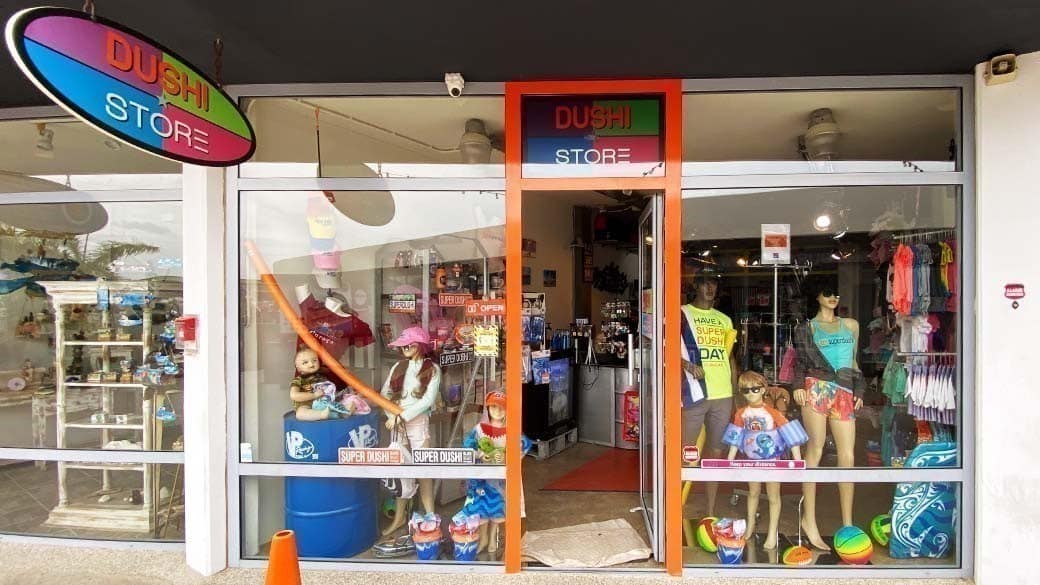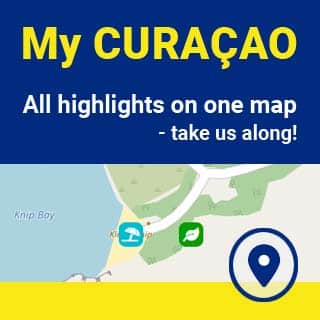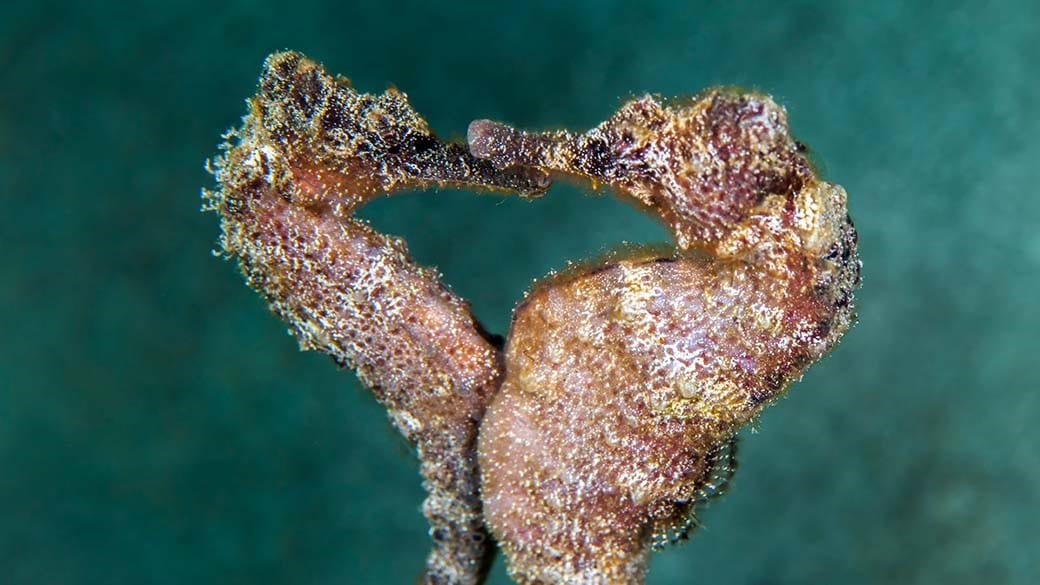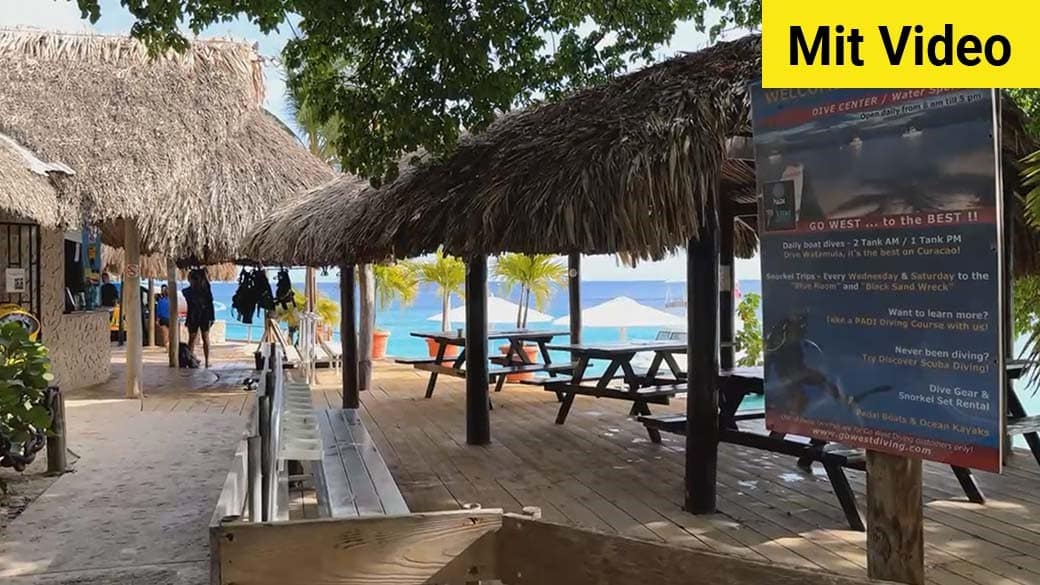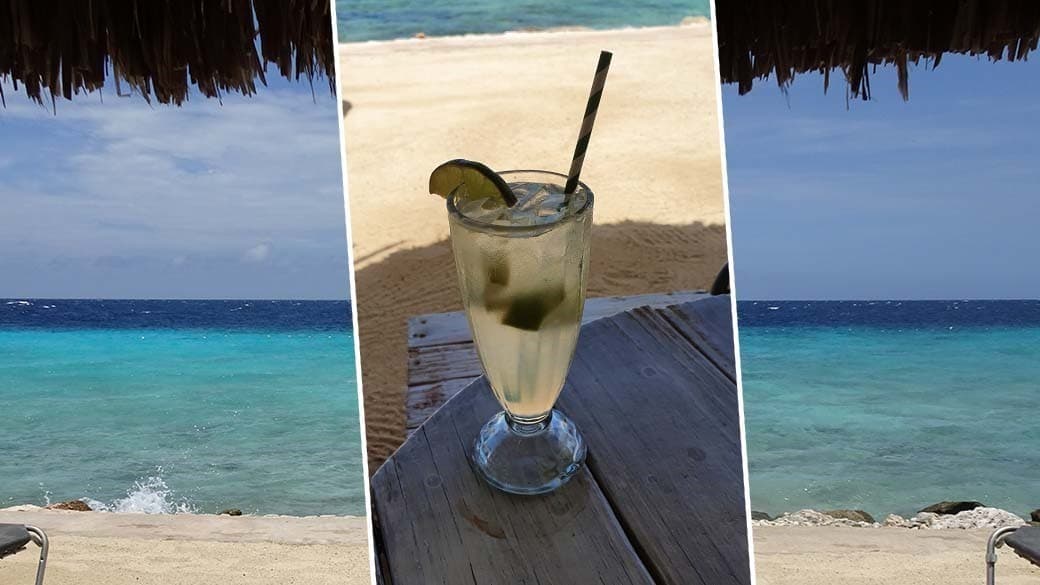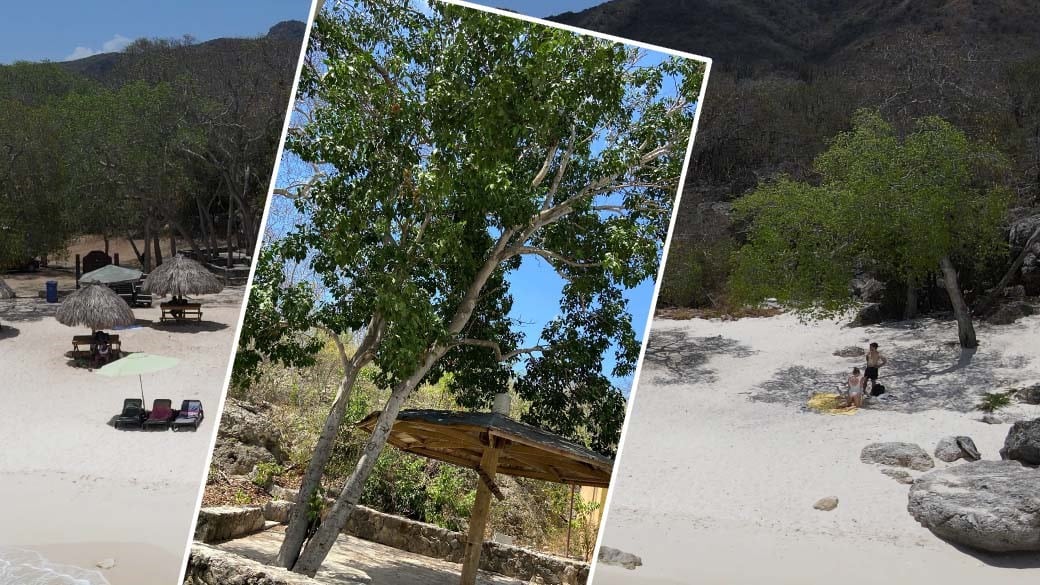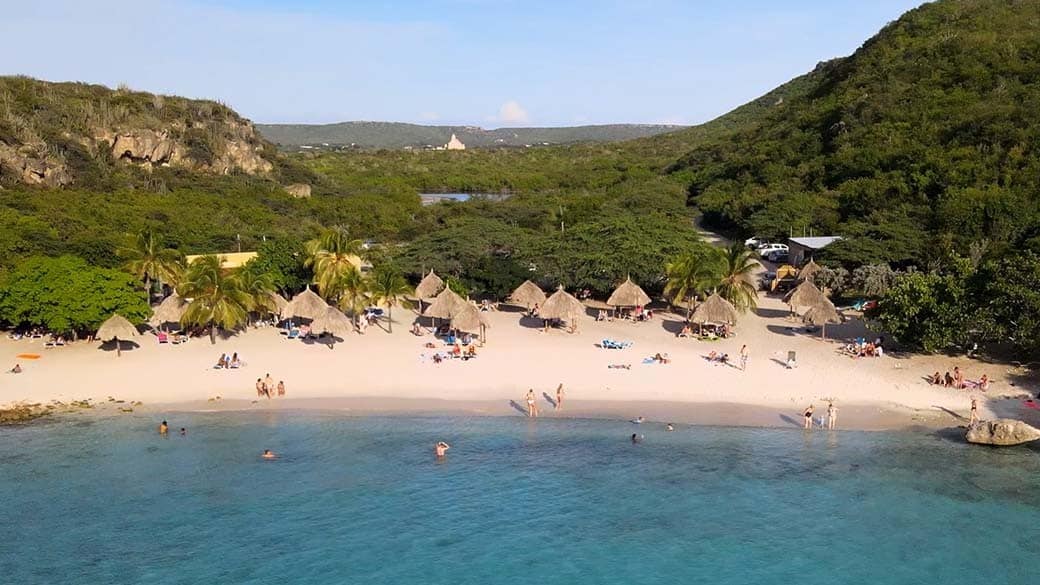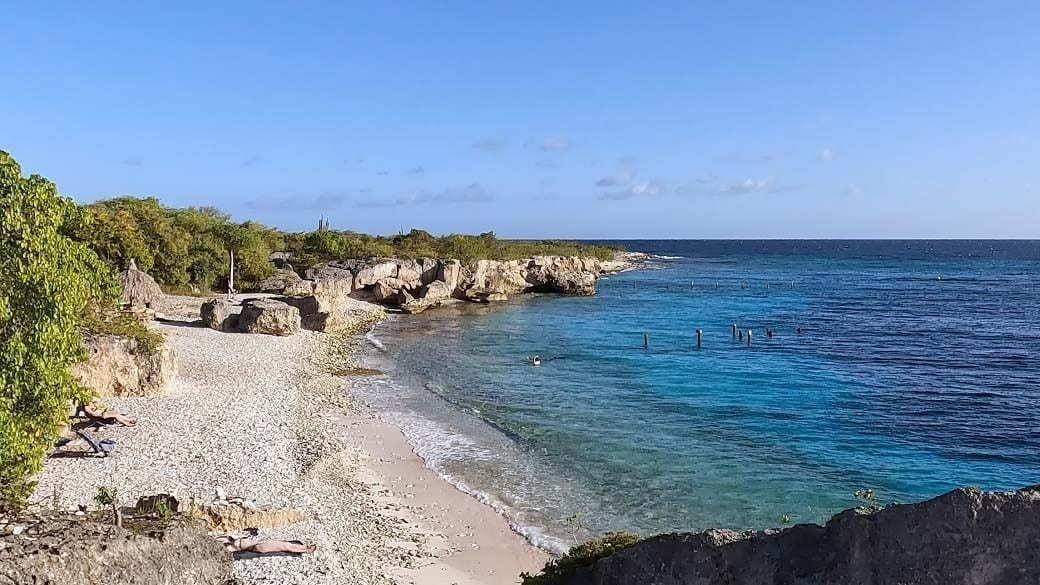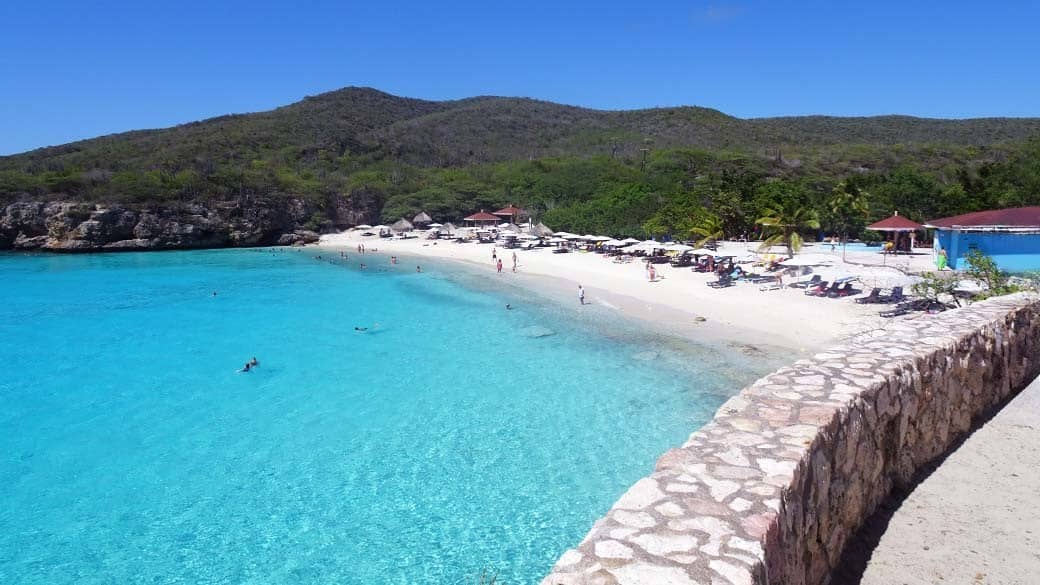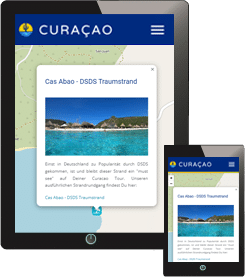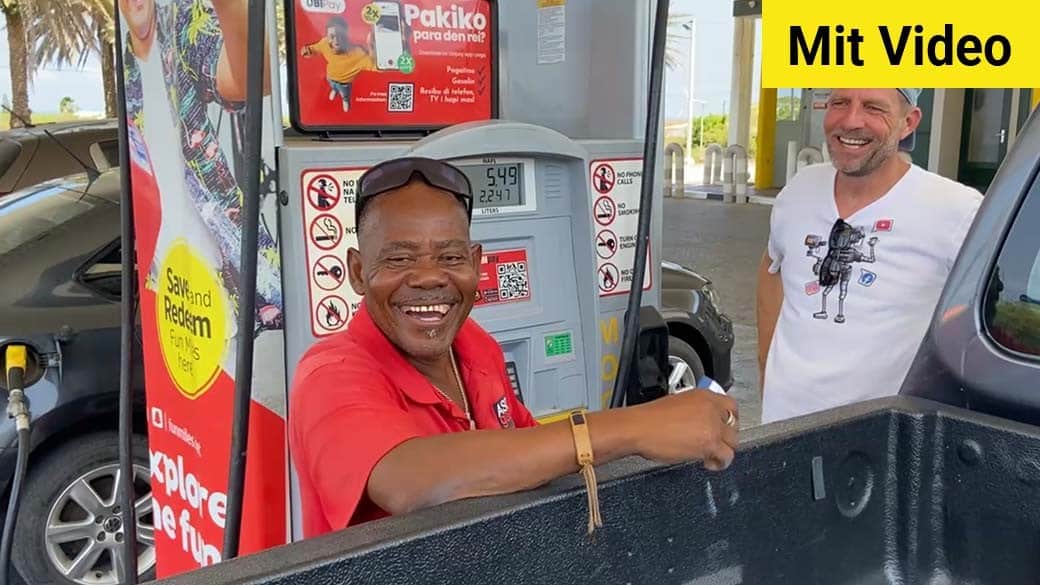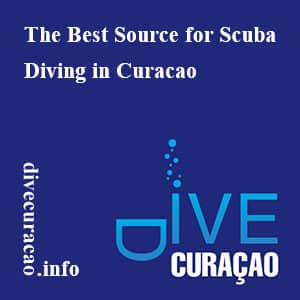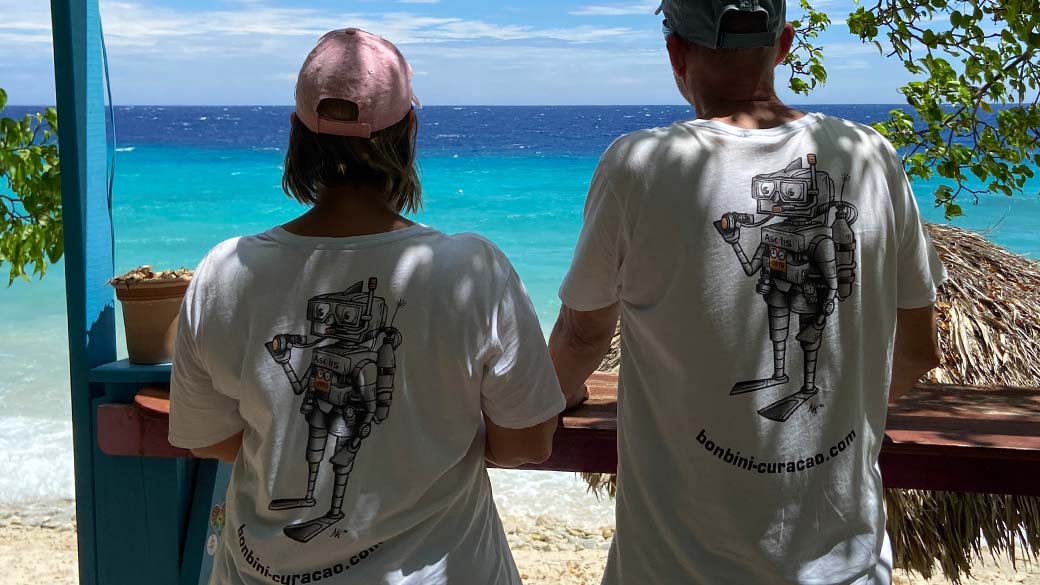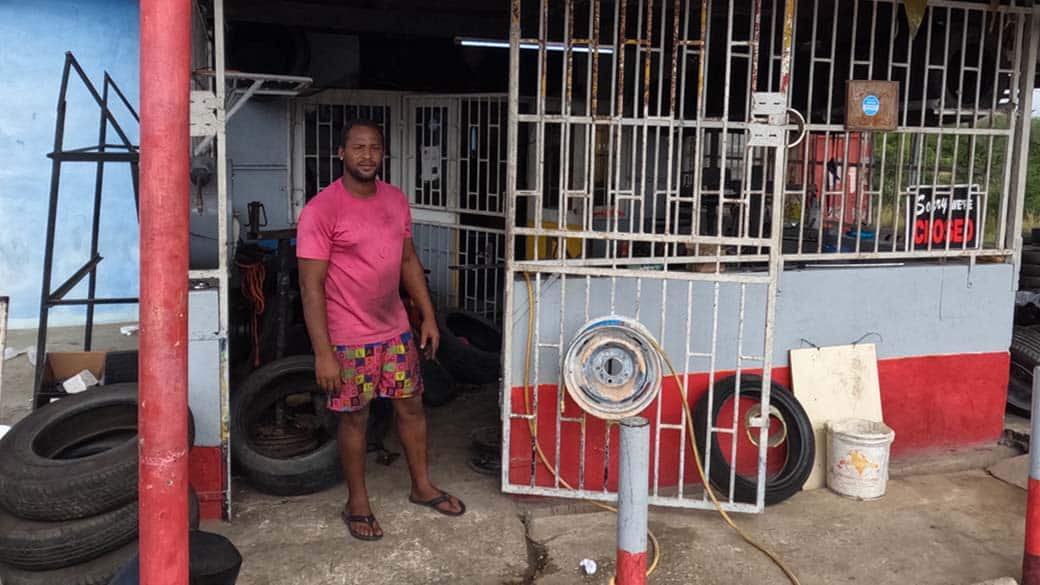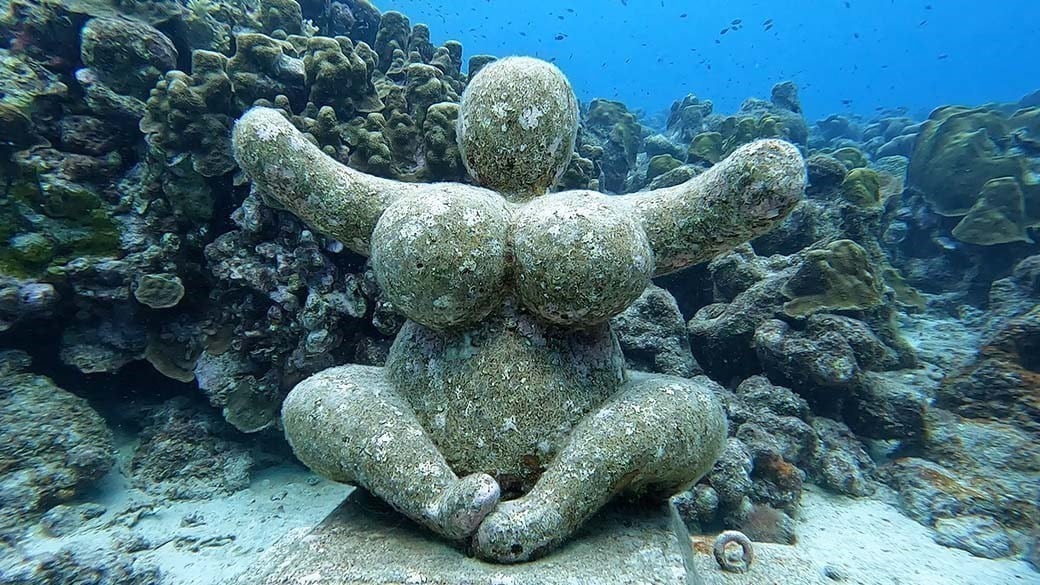Papiamentu
Creole in the ear instead of creoles on the ear
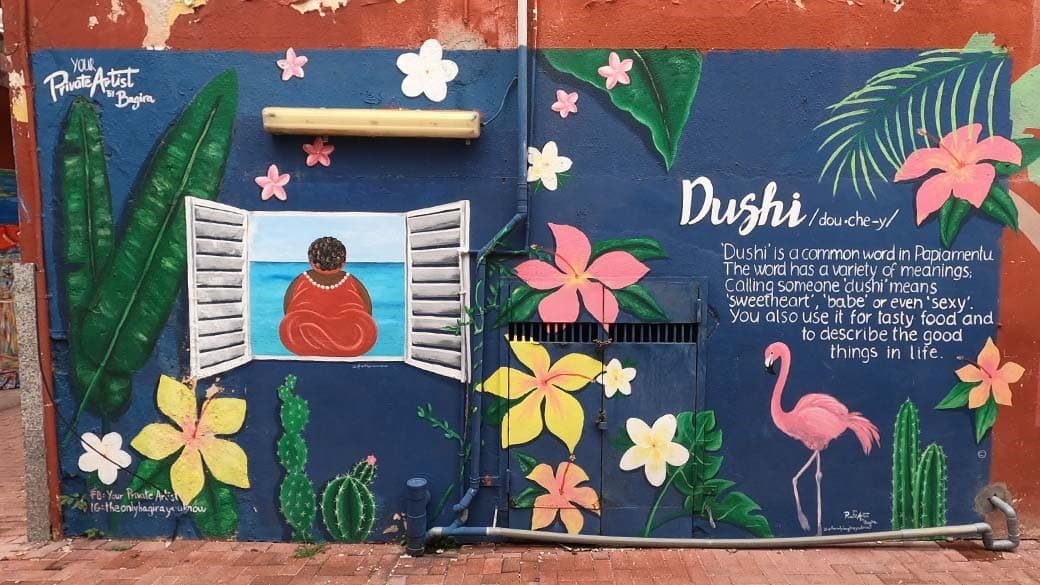
When I heard the first sounds of Papiamentu, the language spoken on Curacao, it reminded me of Spanish at first, but then not quite. It sounded softer somehow and when I picked up the word ‘Danki’, it could almost only correspond to our German word ‘Danke’. That’s because Dutch and German have a lot of similarities.
In fact, several languages have been incorporated into the Creole language Papiamentu. The original inhabitants of Curacao, the Taino, an indigenous Arawak people [link quiz question], spoke the eponymous Taino. Over time, as the island was colonized and its history unfolded, Spanish, Portuguese, Dutch, English, and African languages were added.
The language of the indigenous people
Some words from the Taino vocabulary can still be found in Spanish and in our language today. For example, hamaca (Spanish) = hammock, huracán = hurricane, tobaco = tobacco, maiz = corn, caimán = caiman/crocodile, canoa = canoe. We also have the Taino to thank for the barbecue: the word barbacoa refers to the method of preparing meat over an open fire on a wooden frame.
Official languages of Curacao
The mixed language Papiamentu is one of the three official languages on Curacao, spoken by everyone who grew up here. Skin color, religion or social class play no role. As the island is an autonomous country of the Kingdom of the Netherlands, Dutch is the official language that everyone has to learn at school. I was a little surprised that English is the third official language and not Spanish, which I would have expected due to the proximity to South America. Our friend Alex said:
“No problem, if you know Spanish, you can get by anywhere on Curacao.”
Language is no problem in Curacao, even if you don’t speak any of the official languages. Dutch people often speak German and everyone you meet understands several languages. The friendliness and openness of the people on Curacao makes communication easy – if necessary, you can use your hands and feet. To this day, we’ve never felt like we weren’t understood or that we failed due to language barriers.

Papiamentu, the language of the locals on Curacao
Papiamento versus Papiamentu
The word ‘papia’ means to speak, from which the language name Papiamentu originated. On Aruba they say Papiamento, on Bonaire and Curacao Papiamentu. And to anticipate discussions: Both are correct. The only difference is that Papiamento in Aruba is more closely related to Portuguese and Spanish. As a result, the endings of words with -o have been kept. On Bonaire and Curacao, most -o endings correspond to an -u. As we’re big fans of Curacao, we write Papiamentu with -u.
Curacao has a different name here
We discovered what the locals call their island in the car. We had switched on the radio in our newly rented rental car. The displayed frequency was occupied by a local radio station. We kept hearing the word ‘Korsu’ and wondered what it meant. Google told us that Curacao means Kòrsou in Papiamentu.
Good mood music
There are several Papiamentu-language radio stations on Curacao. They play exactly the music that suits the island feeling on Curacao. These are mainly songs in Papiamentu and always present: Latin American and Caribbean rhythms.
There is a lot of talking on these local stations – you can listen yourself in Papiamentu. The presenters have a blast at work and are always laughing. They create a really good atmosphere.
We think that cruising around the island with music from the local radio stations is incomparable. The journey is the destination: pure vacation feeling.

In Papiamentu, Curacao is called Kòrsou
Curacao also known as
Curacao is not only called Kòrsou. The island has a bunch of other names, some of them quite figurative, such as:
- Pearl of the Caribbean
- Heart of the Caribbean
- Coral Island
- Liqueur Island
- Little Holland
- Island under the wind (due to its geographical location outside the hurricane belt)
- Island of the Giants (due to the impressive size of the indigenous people)
- The C of the ABC islands (A=Aruba, B=Bonaire)
There are all kinds of theories about how the name Curacao got started. For instance, the name Curacao could have originated from the Spanish word “Corazón” or the Portuguese word “Coracao”. Both mean heart. Another interesting theory is that the name of the island is derived from the Portuguese word ‘cura’, which means healing. This is based on the belief that the cure for scurvy is located there. The disease is a vitamin deficiency that sailors suffer from if they are at sea for too long. The island’s fresh fruit had a healing effect.
Personally, I’m more with the heart theory and I really like Curacao as “the heart of the Caribbean”.
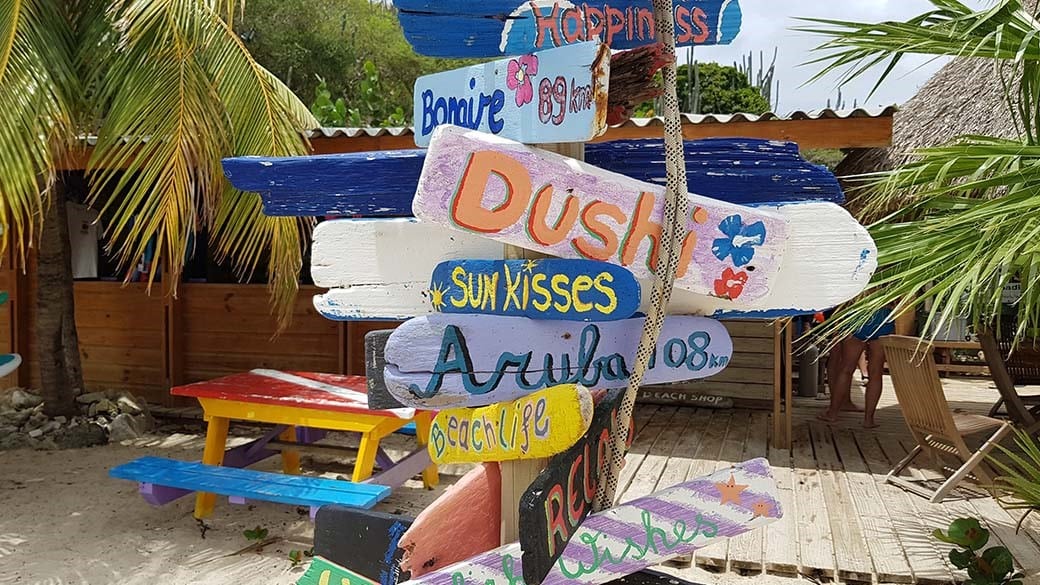
A beach sign with Dushi should never be missing
The most important word in Papiamentu is DUSHI
When it refers to people, Dushi means sweetheart or darling. Depending on the context, it can also describe something as nice or beautiful. It also means delicious or sweet.
Dushi Kadushi is a great rhyming word, but what is it? Kadushi are large, dark green columnar cacti that can be found in abundance on Curacao. Dushi Kadushi means delicious cactus, because you can eat the Kadushi cactus. Green cactus soup is a traditional dish from the local cuisine and the favorite dish of many islanders. We were really keen to find out what it tasted like, so we tried the famous Kadushi soup at Zus di Plaza on our last visit.

Dushi Kadushi soup with Funchi from Zus di Plaza
Is Dushi male or female?
In Curaçao, people often greet each other with “How are you, Dushi” or “Dushi, nice to see you.” It doesn’t matter if you’re a man or a woman, both are Dushi. To address someone as Dushi, you don’t even have to know the person. My friend Sonja called out to a woman who she didn’t know personally and who had obviously dropped something:
“Hey Dushi, you lost something!”
Dushi as a mural, monument and memory
A beautiful mural explains the term Dushi between Windstraat and Passatstraat in Punda. You’ll also see the term Dushi almost everywhere, including on all kinds of souvenirs. Because it’s typical Curacao and Curacao really is Dushi.
On the Wilhelminaplein, you’ll find DUSHI next to CURACAO in oversized capital letters. The two letters are great photo spots in Punda. You can stand in the D or U, crouch down in the S, sit on the H-beam or lean against the I. Feel free to try out your own creative positions – just have fun, Dushi! 😉

Dushi as a letter monument at Wilhelminaplein in Punda, Willemstad
You should definitely take some real Dushi home with you. If not in the form of a memory or a photo, then perhaps as something material. Our souvenir tip at this point is to visit the Dushi Store at Mambo Beach Boulevard. If you walk from the parking lot towards the Mambo Boulevard row of stores, you will pass it directly. There you’ll find out what the intensification of Dushi is. Of course: Superdushi.
Dushi is much more than just a word
It’s a way of life. It’s a lifestyle that exudes the charm and spirit of life in Curacao, but above all, it’s the warmth of the islanders. The first time someone says Dushi to you, regardless of the context, you will feel for yourself what it means.
Bon bini Curacao
Does that sound familiar to you? Sure, you’re surfing the Bonbini Curacao website right now. And just as the island welcomes every visitor, so do we, because Bon bini means welcome.
For your first encounters, in addition to the word Dushi in the local language, we have put together a few greetings. You’re sure to find them useful and use them diligently. The locals will be delighted if you greet and say goodbye to them in their language.
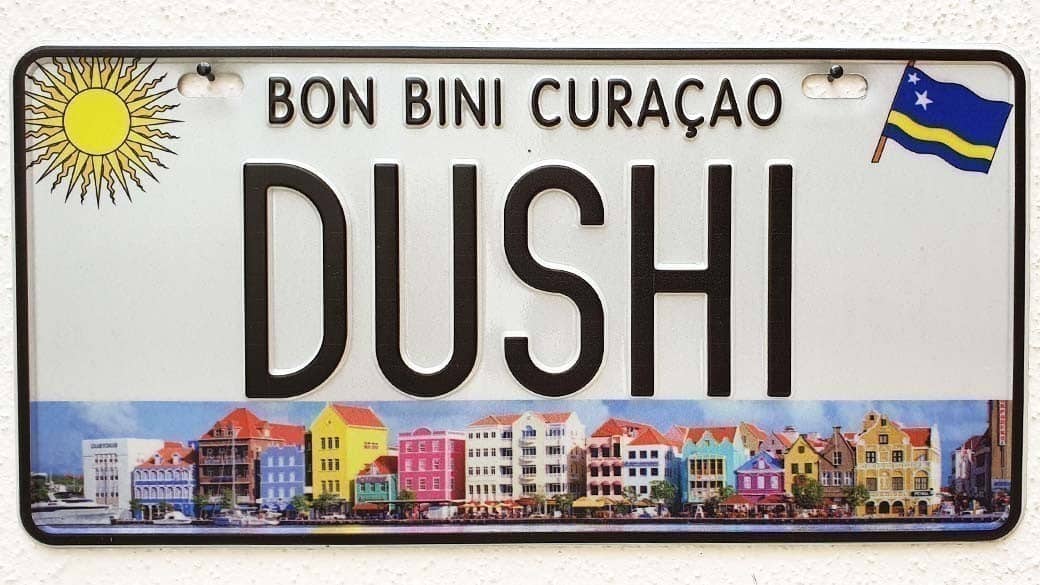
Tourist souvenir: License plate with Dushi and Bon Bini Curacao
The similarity between Papiamentu and other languages can be easily recognized by looking at examples. The word stem is often Spanish/Portuguese and the ending is simplified. We have listed the word in Papiamentu first, followed by Spanish and Portuguese and finally the German translation:
- Bon bini – Bienvenido – Bem vindo – Welcome → ‘bon’ means good and the verb ‘bin’ means to come
- Bon dia – Buenas dias – Bom dia – Good morning / Good day (until noon)
- Bon tardi – Buenas tardes – Boa tarde – Good afternoon (from noon until dark)
- Bon nochi – Buenas noches – Boa noite – Good evening / Good night
- Ayó – Adios – Adeus – Goodbye
A greeting regardless of the time of day is common:
- Kon ta bai? – How are you?
- Kon ta? – How is it? How’s it going?
- Mi ta bon – I’m fine / I’m doing great
- Hopi bon – Very good / very well
It’s important to ask how people are doing because it’s a way of showing interest and making connections.
Door opener in Papiamentu
Just a few words in the local language will not only open doors, but also hearts, and give you special moments on Curacao. Of course, this still includes:
- Masha danki – dank je wel (Dutch) – thank you very much / thank you
- Pa fabor – por favor (Spanish/Portuguese) – Please
- Masha bon – very good
Papiamentu isn’t that difficult, is it?
Mi stima Kòrsou – I love Curacao!
If you’re interested in learning more about the creole language Papiamentu, I can recommend a book. We’ve been looking for translations or dictionaries for some time and only recently found what we were looking for. According to its author, the book is not a hand dictionary aimed at completeness, but a travel companion. I’m happy to share the following book tip with you:
Johannes Kramer (2013): “Kleines etymologisches Wörterbuch, Papiamento – Deutsch, Deutsch – Papiamento”, BUSKE Verlag
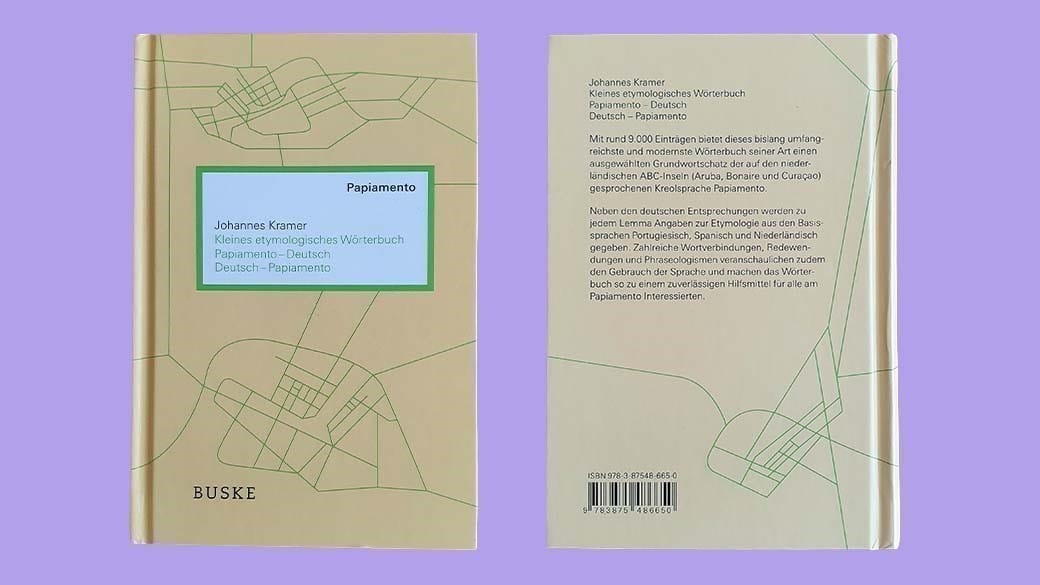
Papiamento dictionary by Johannes Kramer
Perhaps these two online dictionaries might be helpful:
https://www.majstro.com/Web/Majstro/adict.php?gebrTaal=eng&bronTaal=eng&doelTaal=pap&teVertalen=
You won’t find words such as ‘Chichi‘ for ‘big sister’ in these rather small translation aids, but they’re great for simple look-ups.
Integration of Papiamentu in Google Translate
It happened faster than expected! While the integration of Papiamentu into the language selection of Google Translate was announced in May (Curacao Chronicle from May 6, 2024), this became reality at the end of June 2024.
Click here for the English – Papiamentu Google Translator.
Have fun translating!
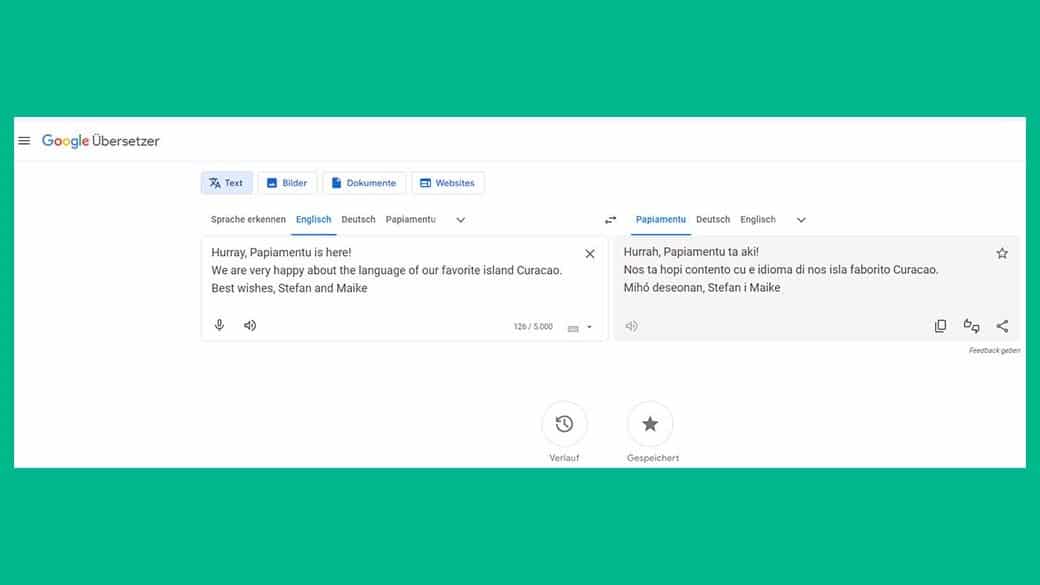
Do you know the answer? We collected 100+ entertaining questions about Curacao. Have fun!
Quiz Question
What is Seú?Answer
Seú is the harvest festival on Curacao. As it always takes place on Easter Monday, the date changes every year.
People parade through the streets of Willemstad dressed in colorful costumes and dancing to traditional music. They celebrate the harvest, each other and their connection with Mother Nature. There is a parade led by a Séu Queen, a singing contest and a headscarf contest.
Do you like more? Here is another post you might be interested in:
If you enjoyed this article, we would be very happy if you share it with your friends on social media. Thank you very much!
Would you like more tips to make your vacation on Curacao even more enjoyable? In our relaxed travel and shopping sections, we explain how. Get to know the flora and fauna in the nature category, find your favorite beach, go snorkeling and diving, and enjoy local delicacies at our suggestions for restaurants and bars.
Papiamentu
Creole in the ear instead of creoles on the ear

When I heard the first sounds of Papiamentu, the language spoken on Curacao, it reminded me of Spanish at first, but then not quite. It sounded softer somehow and when I picked up the word ‘Danki’, it could almost only correspond to our German word ‘Danke’. That’s because Dutch and German have a lot of similarities.
In fact, several languages have been incorporated into the Creole language Papiamentu. The original inhabitants of Curacao, the Taino, an indigenous Arawak people [link quiz question], spoke the eponymous Taino. Over time, as the island was colonized and its history unfolded, Spanish, Portuguese, Dutch, English, and African languages were added.
The language of the indigenous people
Some words from the Taino vocabulary can still be found in Spanish and in our language today. For example, hamaca (Spanish) = hammock, huracán = hurricane, tobaco = tobacco, maiz = corn, caimán = caiman/crocodile, canoa = canoe. We also have the Taino to thank for the barbecue: the word barbacoa refers to the method of preparing meat over an open fire on a wooden frame.
Official languages of Curacao
The mixed language Papiamentu is one of the three official languages on Curacao, spoken by everyone who grew up here. Skin color, religion or social class play no role. As the island is an autonomous country of the Kingdom of the Netherlands, Dutch is the official language that everyone has to learn at school. I was a little surprised that English is the third official language and not Spanish, which I would have expected due to the proximity to South America. Our friend Alex said:
“No problem, if you know Spanish, you can get by anywhere on Curacao.”
Language is no problem in Curacao, even if you don’t speak any of the official languages. Dutch people often speak German and everyone you meet understands several languages. The friendliness and openness of the people on Curacao makes communication easy – if necessary, you can use your hands and feet. To this day, we’ve never felt like we weren’t understood or that we failed due to language barriers.

Papiamentu, the language of the locals on Curacao
Papiamento versus Papiamentu
The word ‘papia’ means to speak, from which the language name Papiamentu originated. On Aruba they say Papiamento, on Bonaire and Curacao Papiamentu. And to anticipate discussions: Both are correct. The only difference is that Papiamento in Aruba is more closely related to Portuguese and Spanish. As a result, the endings of words with -o have been kept. On Bonaire and Curacao, most -o endings correspond to an -u. As we’re big fans of Curacao, we write Papiamentu with -u.
Curacao has a different name here
We discovered what the locals call their island in the car. We had switched on the radio in our newly rented rental car. The displayed frequency was occupied by a local radio station. We kept hearing the word ‘Korsu’ and wondered what it meant. Google told us that Curacao means Kòrsou in Papiamentu.
Good mood music
There are several Papiamentu-language radio stations on Curacao. They play exactly the music that suits the island feeling on Curacao. These are mainly songs in Papiamentu and always present: Latin American and Caribbean rhythms.
There is a lot of talking on these local stations – you can listen yourself in Papiamentu. The presenters have a blast at work and are always laughing. They create a really good atmosphere.
We think that cruising around the island with music from the local radio stations is incomparable. The journey is the destination: pure vacation feeling.

In Papiamentu, Curacao is called Kòrsou
Curacao also known as
Curacao is not only called Kòrsou. The island has a bunch of other names, some of them quite figurative, such as:
- Pearl of the Caribbean
- Heart of the Caribbean
- Coral Island
- Liqueur Island
- Little Holland
- Island under the wind (due to its geographical location outside the hurricane belt)
- Island of the Giants (due to the impressive size of the indigenous people)
- The C of the ABC islands (A=Aruba, B=Bonaire)
There are all kinds of theories about how the name Curacao got started. For instance, the name Curacao could have originated from the Spanish word “Corazón” or the Portuguese word “Coracao”. Both mean heart. Another interesting theory is that the name of the island is derived from the Portuguese word ‘cura’, which means healing. This is based on the belief that the cure for scurvy is located there. The disease is a vitamin deficiency that sailors suffer from if they are at sea for too long. The island’s fresh fruit had a healing effect.
Personally, I’m more with the heart theory and I really like Curacao as “the heart of the Caribbean”.

A beach sign with Dushi should never be missing
The most important word in Papiamentu is DUSHI
When it refers to people, Dushi means sweetheart or darling. Depending on the context, it can also describe something as nice or beautiful. It also means delicious or sweet.
Dushi Kadushi is a great rhyming word, but what is it? Kadushi are large, dark green columnar cacti that can be found in abundance on Curacao. Dushi Kadushi means delicious cactus, because you can eat the Kadushi cactus. Green cactus soup is a traditional dish from the local cuisine and the favorite dish of many islanders. We were really keen to find out what it tasted like, so we tried the famous Kadushi soup at Zus di Plaza on our last visit.

Dushi Kadushi soup with Funchi from Zus di Plaza
Is Dushi male or female?
In Curaçao, people often greet each other with “How are you, Dushi” or “Dushi, nice to see you.” It doesn’t matter if you’re a man or a woman, both are Dushi. To address someone as Dushi, you don’t even have to know the person. My friend Sonja called out to a woman who she didn’t know personally and who had obviously dropped something:
“Hey Dushi, you lost something!”
Dushi as a mural, monument and memory
A beautiful mural explains the term Dushi between Windstraat and Passatstraat in Punda. You’ll also see the term Dushi almost everywhere, including on all kinds of souvenirs. Because it’s typical Curacao and Curacao really is Dushi.
On the Wilhelminaplein, you’ll find DUSHI next to CURACAO in oversized capital letters. The two letters are great photo spots in Punda. You can stand in the D or U, crouch down in the S, sit on the H-beam or lean against the I. Feel free to try out your own creative positions – just have fun, Dushi! 😉

Dushi as a letter monument at Wilhelminaplein in Punda, Willemstad
You should definitely take some real Dushi home with you. If not in the form of a memory or a photo, then perhaps as something material. Our souvenir tip at this point is to visit the Dushi Store at Mambo Beach Boulevard. If you walk from the parking lot towards the Mambo Boulevard row of stores, you will pass it directly. There you’ll find out what the intensification of Dushi is. Of course: Superdushi.
Dushi is much more than just a word
It’s a way of life. It’s a lifestyle that exudes the charm and spirit of life in Curacao, but above all, it’s the warmth of the islanders. The first time someone says Dushi to you, regardless of the context, you will feel for yourself what it means.
Bon bini Curacao
Does that sound familiar to you? Sure, you’re surfing the Bonbini Curacao website right now. And just as the island welcomes every visitor, so do we, because Bon bini means welcome.
For your first encounters, in addition to the word Dushi in the local language, we have put together a few greetings. You’re sure to find them useful and use them diligently. The locals will be delighted if you greet and say goodbye to them in their language.

Tourist souvenir: License plate with Dushi and Bon Bini Curacao
The similarity between Papiamentu and other languages can be easily recognized by looking at examples. The word stem is often Spanish/Portuguese and the ending is simplified. We have listed the word in Papiamentu first, followed by Spanish and Portuguese and finally the German translation:
- Bon bini – Bienvenido – Bem vindo – Welcome → ‘bon’ means good and the verb ‘bin’ means to come
- Bon dia – Buenas dias – Bom dia – Good morning / Good day (until noon)
- Bon tardi – Buenas tardes – Boa tarde – Good afternoon (from noon until dark)
- Bon nochi – Buenas noches – Boa noite – Good evening / Good night
- Ayó – Adios – Adeus – Goodbye
A greeting regardless of the time of day is common:
- Kon ta bai? – How are you?
- Kon ta? – How is it? How’s it going?
- Mi ta bon – I’m fine / I’m doing great
- Hopi bon – Very good / very well
It’s important to ask how people are doing because it’s a way of showing interest and making connections.
Door opener in Papiamentu
Just a few words in the local language will not only open doors, but also hearts, and give you special moments on Curacao. Of course, this still includes:
- Masha danki – dank je wel (Dutch) – thank you very much / thank you
- Pa fabor – por favor (Spanish/Portuguese) – Please
- Masha bon – very good
Papiamentu isn’t that difficult, is it?
Mi stima Kòrsou – I love Curacao!
If you’re interested in learning more about the creole language Papiamentu, I can recommend a book. We’ve been looking for translations or dictionaries for some time and only recently found what we were looking for. According to its author, the book is not a hand dictionary aimed at completeness, but a travel companion. I’m happy to share the following book tip with you:
Johannes Kramer (2013): “Kleines etymologisches Wörterbuch, Papiamento – Deutsch, Deutsch – Papiamento”, BUSKE Verlag

Papiamento dictionary by Johannes Kramer
Perhaps these two online dictionaries might be helpful:
https://www.majstro.com/Web/Majstro/adict.php?gebrTaal=eng&bronTaal=eng&doelTaal=pap&teVertalen=
You won’t find words such as ‘Chichi‘ for ‘big sister’ in these rather small translation aids, but they’re great for simple look-ups.
Integration of Papiamentu in Google Translate
It happened faster than expected! While the integration of Papiamentu into the language selection of Google Translate was announced in May (Curacao Chronicle from May 6, 2024), this became reality at the end of June 2024.
Click here for the English – Papiamentu Google Translator.
Have fun translating!

Our reading recommendation for you:
Curacao is alive and things are always changing. What has changed since our last visit? How is your experience? Would you please share your personal experiences with us? Feel free to write your comment under this article and follow us on our social media channels. There you can spontaneously share your personal impressions with us and our community - "sharing is caring". We look forward to your contribution and every new follower!
Leave A Comment
Quiz Question
What is Seú?Answer
Seú is the harvest festival on Curacao. As it always takes place on Easter Monday, the date changes every year.
People parade through the streets of Willemstad dressed in colorful costumes and dancing to traditional music. They celebrate the harvest, each other and their connection with Mother Nature. There is a parade led by a Séu Queen, a singing contest and a headscarf contest.
#withus - our articles at your fingertips on a common map - try it!






